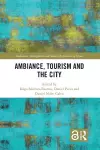
Ambiance, Tourism and the City
3 contributors - Hardback
£135.00
Iñigo Sánchez-Fuarros is Ramón y Cajal senior postdoctoral researcher at the Institute of Heritage Sciences (INCIPIT-CSIC) in Santiago de Compostela (Spain). He holds a PhD in Anthropology (University of Barcelona). Previously, he worked as a postdoctoral researcher at NOVA University (Lisbon, Portugal) and Queen’s University Belfast (UK). He is the author of Cubaneando en Barcelona: música, migración y experiencia urbana (2012). His research interests cover urban sound and music cultures, tourism and urban transformation, critical heritage regimes, and more recently the material culture of festivities.
Daniel Paiva is a human geographer interested in the experience of urban space in consumption and touristic areas. He holds a European PhD (2019) in Geography by the Universidade de Lisboa. In 2019, he was awarded a postdoctoral research fellowship to undertake a six-year research project at the Centre for Geographical Studies of the Universidade de Lisboa to explore the integration of art, urban design and geotechnologies to create more sustainable human-nature interactions in urban public space. His research has been published in several geography and social science journals, including but not limited to Progress in Human Geography, Transactions of the Institute of British Geographers, Annals of the American Association of Geographers, Geography Compass, and Urban Geography.
Daniel Malet Calvo is assistant researcher at the Centre for Research and Studies in Sociology (CIES) at ISCTE – the University Institute of Lisbon (Portugal). He is also guest lecturer at different undergraduate and PhD programs at ICSTE-IUL. As a trained anthropologist and historian specialized on urban studies and ethnography, his research interests cover international students and student migration (youth cultures, social class and lifestyle mobility), urban transformation (nightlife gentrification, heritage, touristification and social movements), urban infrastructures (daily mobility, urban planning and public space), and race and ethnicity in urban contexts.